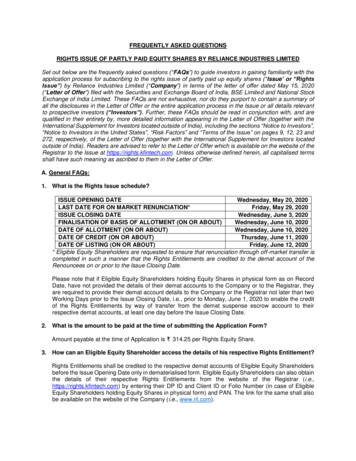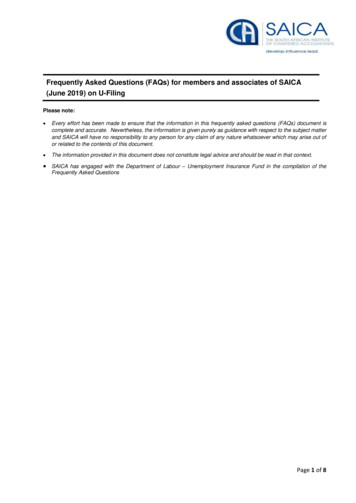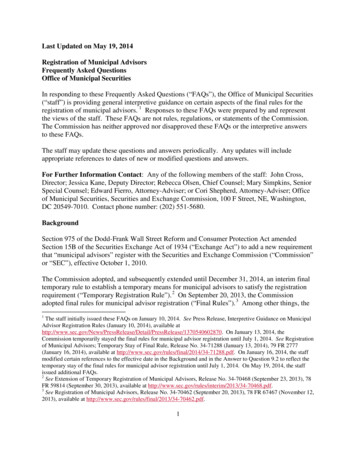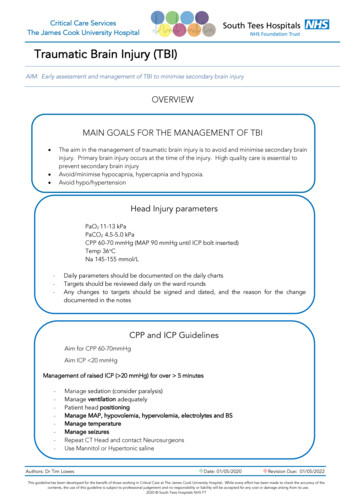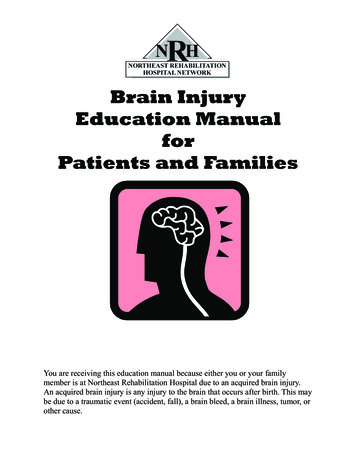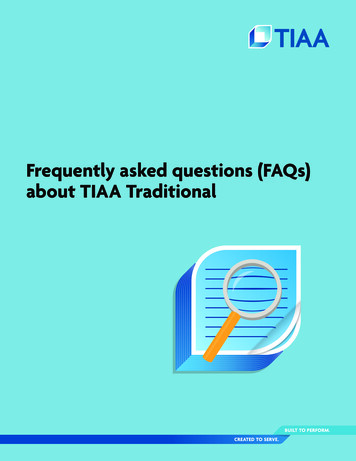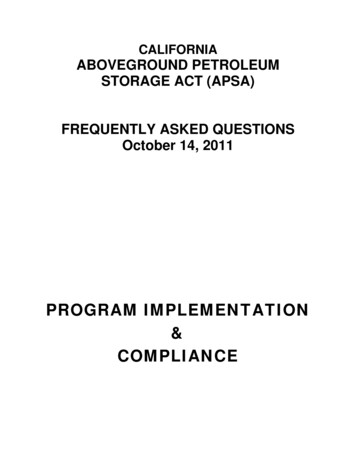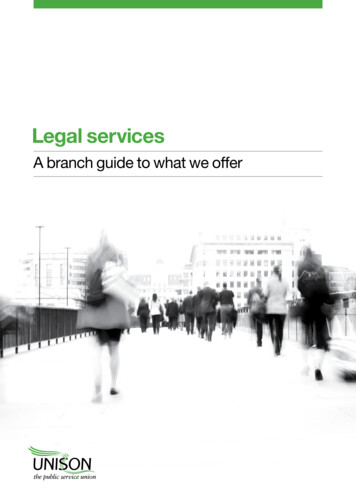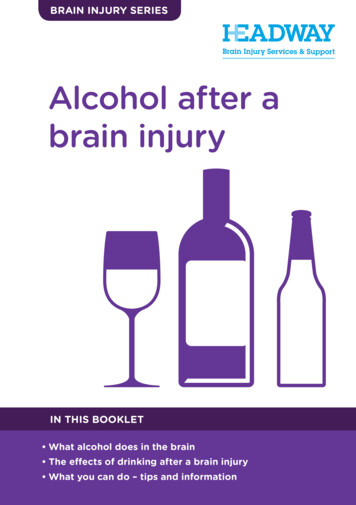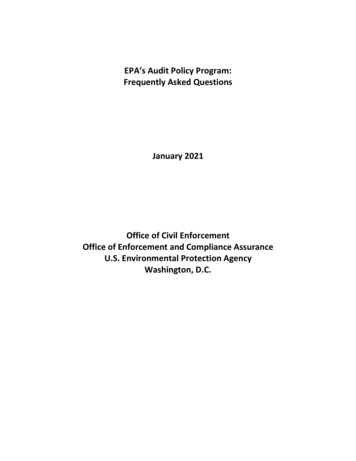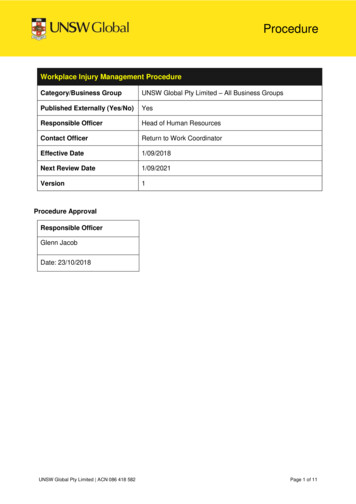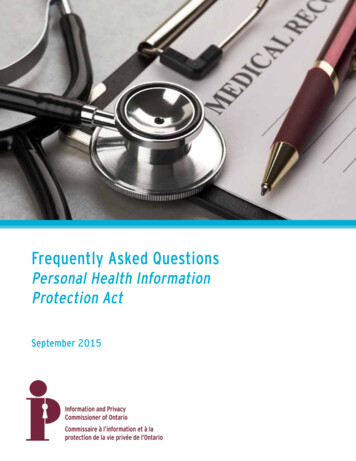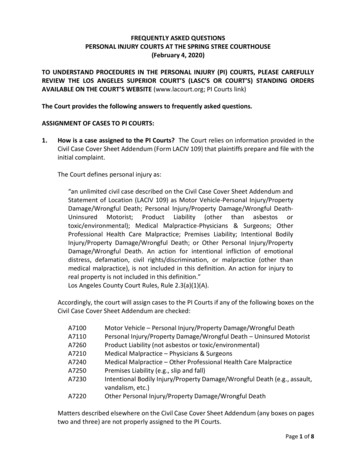
Transcription
FREQUENTLY ASKED QUESTIONSPERSONAL INJURY COURTS AT THE SPRING STREE COURTHOUSE(February 4, 2020)TO UNDERSTAND PROCEDURES IN THE PERSONAL INJURY (PI) COURTS, PLEASE CAREFULLYREVIEW THE LOS ANGELES SUPERIOR COURT’S (LASC’S OR COURT’S) STANDING ORDERSAVAILABLE ON THE COURT’S WEBSITE (www.lacourt.org; PI Courts link)The Court provides the following answers to frequently asked questions.ASSIGNMENT OF CASES TO PI COURTS:1.How is a case assigned to the PI Courts? The Court relies on information provided in theCivil Case Cover Sheet Addendum (Form LACIV 109) that plaintiffs prepare and file with theinitial complaint.The Court defines personal injury as:“an unlimited civil case described on the Civil Case Cover Sheet Addendum andStatement of Location (LACIV 109) as Motor Vehicle-Personal Injury/PropertyDamage/Wrongful Death; Personal Injury/Property Damage/Wrongful DeathUninsured Motorist; Product Liability (other than asbestos ortoxic/environmental); Medical Malpractice-Physicians & Surgeons; OtherProfessional Health Care Malpractice; Premises Liability; Intentional BodilyInjury/Property Damage/Wrongful Death; or Other Personal Injury/PropertyDamage/Wrongful Death. An action for intentional infliction of emotionaldistress, defamation, civil rights/discrimination, or malpractice (other thanmedical malpractice), is not included in this definition. An action for injury toreal property is not included in this definition.”Los Angeles County Court Rules, Rule 2.3(a)(1)(A).Accordingly, the court will assign cases to the PI Courts if any of the following boxes on theCivil Case Cover Sheet Addendum are tor Vehicle – Personal Injury/Property Damage/Wrongful DeathPersonal Injury/Property Damage/Wrongful Death – Uninsured MotoristProduct Liability (not asbestos or toxic/environmental)Medical Malpractice – Physicians & SurgeonsMedical Malpractice – Other Professional Health Care MalpracticePremises Liability (e.g., slip and fall)Intentional Bodily Injury/Property Damage/Wrongful Death (e.g., assault,vandalism, etc.)Other Personal Injury/Property Damage/Wrongful DeathMatters described elsewhere on the Civil Case Cover Sheet Addendum (any boxes on pagestwo and three) are not properly assigned to the PI Courts.Page 1 of 8
2.Can the Court, on its own or at the request of a party, transfer a case from a PI Court toan Independent Calendar Court? Yes. Using the Motion/Opposition/Stipulation to TransferComplicated Personal Injury Case to Independent Calendar (“IC”) Court (Form LACIV 238available online, under the link accessible in the Civil Division, Specialty Courts, GeneralJurisdiction PI Courts link), any party may move to transfer a case from a PI Court to an ICCourt. The PI Courts will transfer a matter to an IC Court if the case is not a “Personal Injury”case as defined in the Standing Order re Personal Injury Court (“PI Court”) Procedures,Central District, or if it is deemed “complicated.” In determining whether a PI case is more“complicated” than the PI Courts can manage, the PI Courts will consider, among otherthings, whether the case involves numerous parties, cross-complaints, and/or numerousanticipated pretrial motions and hearings.3.When is a case too “complicated” for the PI Courts? The five PI Courts (Departments 27,28, 29, 31 and 32) are managing all pretrial matters for more than 30,000 cases with theexpectation that cases involving motor vehicle PI accidents, premises liability (e.g. a “slipand fall” case) and medical malpractice do not generate more than a few pretrial motions,hearings, or other court proceedings. Although the trial courts presently handling PI trialsare prepared to conduct long and complex trials, the PI Courts are not equipped to handleextensive pretrial proceedings. For example, a PI case that involves numerous causes ofaction, multiple parties, one or more cross-complaints, several discovery disputes andissues of first impression will require more pretrial court resources than the PI Courts canoffer. At the direction of Department 1, the PI Courts transfer such cases to IC Courtsbecause the IC Courts have greater capacity to manage such cases. The PI Courts routinelytransfer elder abuse cases and landlord/tenant habitability cases to the IC Courts on thatbasis.4.If the PI Courts transfer a case to an Independent Calendar Court, where will the case bereassigned? At the direction of Department 1, the PI Courts will return cases filed beforeMarch 18, 2013, to the IC Court assigned to the case before it was transferred to the PICourts. If the judge presiding in the previous IC Court is no longer available, the case will beassigned to another IC Court in the same district. The Court will likewise reassign a case filedon or after March 18, 2013, to an IC Court in the district where the injury or damageoccurred.TRIALS:5.What time are trials set in the PI Courts? 8:30 a.m., Monday through Friday.6.Where should witnesses appear? Counsel should subpoena witnesses to appear in the PICourt. If the PI Court judge deems the case trial-ready, the PI Court will order theparties/counsel/witnesses to the trial court assigned by Department 1 to conduct the trial.7.What is a trial-ready case? The PI Courts will deem a case ready for trial when all partieshave filed and/or are ready to lodge trial documents and exhibits as directed in theoperative Standing Order – Re: Final Status Conference, Personal Injury (“PI”) Courts (e.g.,Page 2 of 8
binders containing the trial documents, joint statement of the case, joint witness list, jointexhibit list, jury instructions, verdict form(s), page and line designation for deposition andformer testimony, copies of the operative pleadings, and exhibit binders). The PI Courtsgenerally will not deem a case ready for trial unless all parties announce that they are readyto proceed with trial continuously from day to day until completed and provide a good faithestimate of the length of trial.8.Are the PI Courts conducting Mandatory Settlement Conferences? Yes. Parties in casesassigned to the PI Courts may be ordered to participate in the Mandatory SettlementConference Program for Personal Injury Cases supervised by the PI Court judges and staffedby volunteer settlement attorneys from the American Board of Trial Advocates (ABOTA),the Association of Southern California Defense Counsel (ASCDC) and the ConsumerAttorneys Association of Los Angeles (CAALA). In addition to the Mandatory SettlementConference Program, Mandatory Settlement Conferences may be held in all PI Courts at thediscretion of the PI Court judge.9.How does Department 1 assign cases for trial? Department 1 makes trial assignmentsbased on three factors: (1) which trial courts are open for trial; (2) where the accident orinjury occurred (sending the case closer to that location if possible); and (3) the evendistribution of work among the trial courts. Department 1 announces the identity of thejudge and the location of the courthouse where it will transfer the case. The Courtmaintains two lists of judges that are available to hear personal injury trials. One list isentitled, “Civil Judges Hearing Trials Assigned from Department 1.” The other list is entitled,“Criminal Judges Hearing Civil Trials.” Both are posted on the Court’s website and updatedperiodically. For purposes of motions to disqualify judges under the Code of Civil ProcedureSection 170.6, Department 1 operates as a Master Calendar Court. If a personal injury caseis assigned by Department 1 for trial to a judge that is on either list, then the parties have20 minutes after the matter is assigned to exercise a peremptory challenge pursuant to CCP§ 170.6. However, if a personal injury case is assigned by Department 1 for trial to a judgethat is not on either list, then the parties have 60 minutes after the matter is assigned toexercise a peremptory challenge pursuant to CCP § 170.6. This procedure provides theparties and counsel time to determine whether to file a written motion to disqualify thetrial judge under C.C.P. § 170.6. Written forms for C.C.P. § 170.6 motions are available inDepartment 1. Under C.C.P. § 170.6, any motion to disqualify a judge after Department 1transfers the case to a trial court is untimely.10. Is there any way to anticipate which trial judge might be assigned to hear my case? No.11. Are general jurisdiction PI trials commencing on the trial date? Department 1 generallyassigns every PI case out for trial on the same day, or within one week. In many cases, thetrial court hears motions in limine and attends to other pretrial matters on the trial dateand calls in a jury panel to commence jury selection that day or the following morningdepending on a number of factors, including the number of jurors available for service thatday.Page 3 of 8
12. What if all trial courts are unavailable? In the event that all trial courts are engaged inother trials or otherwise unavailable within one week of the trial date, Department 1 willtransfer the case back to the PI Court to obtain a continued trial date.13. Who hears motions in limine? In general, the trial court judge hears in limine motions.14. How can I continue the trial date? Parties may submit a maximum of two stipulations tocontinue trial for a total/combined continuance of six months. The parties should file aProposed Order and a Stipulation to Continue Trial, FSC and Related Motion/DiscoveryDates Personal Injury Courts Only (Form LACIV 242 available online - under the linkaccessible in the Civil Division, Specialty Courts, General Jurisdiction PI Court link) (feerequired). So long as all parties agree to continue or advance a trial date for a total of sixmonths or less, the parties do not need to show good cause or articulate any reason orjustification for continuing or advancing a trial date. The Court encourages and expects theparties to meet and confer and to stipulate, rather than litigate, reasonable requests forcontinuance of trial dates.Subsequent requests to continue trial will generally be granted only upon a showing of goodcause. Counsel are strongly reminded to manage pretrial litigation and trial preparation tomeet all pretrial discovery and motion deadlines. The PI Courts generally do not regard thecontinuance of a trial as an emergency justifying ex parte relief.15. What if I cannot reserve a motion hearing date more than 30 days before the scheduledtrial date? If the Court Reservation System (CRS) indicates that a PI Court’s earliest availablemotion dates are untimely (i.e., within 30 days of trial or after the trial date), the movingparty should reserve the earliest available hearing date, and the moving party should file anoticed motion to continue trial.Do not file an ex parte application for an order shortening time to hear the motion beforethe trial date unless there is a showing of irreparable harm or danger or other statutorybasis for granting ex parte relief.FINAL STATUS CONFERENCES (FSC):16. What time are FSCs in PI Courts? 10:00 a.m., Monday through Friday.17. How far in advance of trial do the PI Courts calendar the FSC? The PI Courts calendar FSCseight court days before the trial date. These dates are assigned upon filing of the complaint.18. Are there any particular requirements for a PI Court FSC? Yes. They are outlined in theoperative Standing Order – Re: Final Status Conference, Personal Injury (“PI”) Courts.19. How do I get a copy of the Standing Order – Re: Final Status Conference, Personal Injury(“PI”) Courts? Counsel may view the Standing Order – Re: Final Status Conference, PersonalInjury (“PI”) Courts on the Court’s website in the General Jurisdiction PI Court section of theCivil Tab or obtain a hard copy in any of the five PI Courts. Upon the initial filing of thePage 4 of 8
complaint, plaintiff(s) must serve the Standing Order Re Personal Injury Court (“PI Court”)Procedures, Central District, and the Standing Order – Re: Final Status Conference, PersonalInjury (“PI”) Courts.20. Do I need to bring all of my exhibits and trial readiness documents to the FSC? If theparties have a joint signed exhibit list and electronic copies of their respective exhibits, thenthe parties are not required to produce exhibit binders at the FSC. However, the exhibitbinders will be required by the assigned trial judge when the trial commences. In theabsence of either a joint signed exhibit list or electronic copies, exhibit binders are requiredof all parties at the FSC.21. What if the other side fails or refuses to cooperate in preparing the FSC documents? Eachparty has an independent duty to comply with the FSC Order. The Court has discretion toimpose sanctions for any unexcused failure to comply, ranging from monetary sanctions toexclusion of evidence, issue preclusion, denial of a claim or defense, dismissal, and/ordefault.EX PARTE APPLICATIONS:22. Are there any special rules regarding ex parte applications in PI Courts? No. Under theCalifornia Rules of Court, the PI Courts may only grant ex parte relief upon a showing, byadmissible evidence, that the moving party will suffer “irreparable harm,” “immediatedanger,” or where the moving party identifies “a statutory basis for granting relief ex parte.”C.R.C. Rule 3.1202(c). Parties must comply with C.R.C. Rule 3.1200, et seq., and Los AngelesCounty Court Rules, Rule 3.5.23. When do the PI Courts hear ex parte applications? The PI Courts consider ex parteapplications daily at 8:30 a.m. Ex parte applications must be electronically filed unless theparty is a self-represented litigant or the attorney or party has obtained an exemption frommandatory electronic filing. See operative General Order Re Mandatory Electronic Filingfor Civil, available online at www.lacourt.org (link on homepage). A list of documentsexempt from eFiling is also included in the General Order. The PI Courts will deny orcontinue late-filed ex parte applications.24. Should I come in ex parte to get a timely hearing date on a pretrial motion? In mostcircumstances, no. See FAQ #15 and FAQ #22 above.NOTICED MOTIONS:25. When do the PI Courts hear noticed motions? Except for motions to compel furtherdiscovery (which are heard at 10:00 a.m.), the PI Courts hear and decide motions at 1:30p.m., Monday through Friday.Parties must participate in an Informal Discovery Conference with a PI Court judge beforethe Court hears a motion to compel further discovery. Please read FAQ #29 and FAQ #30for additional information on IDCs.Page 5 of 8
26. What if I reserved a hearing date for a motion that I no longer wish to pursue? As soonas a moving party realizes that it will not require a hearing on a reserved motion date in thePI Courts, that party must immediately use CRS to cancel the reservation. This procedure isimperative because other parties are actively searching CRS for available hearing dates.Please note, the filing fee paid at the time of reservation is non-refundable. Counsel/partiesmust also notify courtroom staff at the appropriate email address to take matters offcalendar. The email addresses for the PI courtrooms can be found on the Court’s websiteat www.lacourt.org, under “Division” go to “Civil”, then go to “General Jurisdiction PI Court”then click on “PI Courtroom Email Addresses”.27. How do I get a hearing date for my motion? The parties must use CRS (online atwww.lacourt.org) to reserve a motion hearing date. After reserving a hearing date, thereservation requestor must submit the papers for filing with the reservation receipt numberprinted on the face page of the document under the caption and attach the CRS reservationreceipt as the last page. If you are unable to utilize the online reservation system, you mayreserve a motion hearing date by telephoning the PI Court courtroom between 3:00 p.m.and 4:00 p.m., Monday through Friday. To reserve an Informal Discovery Conference (IDC),please see FAQ #30.28. Do the PI Courts post tentative rulings on motions? Time permitting, the PI judges posttentative rulings on the Court’s website (www.lacourt.org, Civil - Tentative Rulings link).Instructions for communicating with court staff regarding tentative rulings, includinginstructions for submitting on the tentative rulings, are located on the Tentative Rulingsscreen on the Court website. All tentative rulings posted on the website are also availablefor review in the courtroom on the day of hearing.29. What is an Informal Discovery Conference? An IDC is an informal, in-person, 30-minutemeeting among counsel and the judge. On a daily basis, the PI Court judges are available toconduct IDCs by meeting in person with lead trial counsel on each side (or another attorneywho has full authority to make binding agreements in discovery disputes). The purpose ofthe IDC is to help the parties resolve discovery disputes by agreement rather than motionpractice. To that end, the IDC judge may cite the parties to applicable code sections or otherlegal authorities. The judge may also promote compromise by suggesting agreements tonarrow the scope of the requests, provide amended responses that better explain theresponding party’s compliance, or use an alternative, more efficient means of discovery.The PI Court judges will not make rulings during an IDC. The PI Court judges find that, mostoften, the parties amicably resolve their discovery disputes at, or as a result of, the IDC. ThePI Court judges also find that subsequent discovery disputes among the participants arerare. The PI Court judges may consider a party’s failure or refusal to participate in an IDC indeciding whether to award sanctions requested on a motion to compel further responsesto discovery.Page 6 of 8
30. How do I reserve a date for an IDC? Parties use CRS to reserve an IDC date (online atwww.lacourt.org). Parties must meet and confer regarding the available dates in CRS priorto accessing the system. After reserving the IDC date, the reservation requestor must fileand serve an Informal Discovery Conference Form for Personal Injury Courts, Form LACIV239 (the “IDC Form”), at least 15 court days prior to the conference and attach the CRSreservation receipt as the last page. The opposing party may file and serve a responsive IDCForm, briefly setting forth that party’s response, at least ten court days prior to the IDC.31. What if I have to file a motion to compel further discovery? The PI Courts will not hearmotions to compel further discovery unless and until (a) the parties participate in an IDC;or (b) the moving party submits evidence, by way of declaration, that the opposing partyhas failed or refused to participate in an IDC. To allow time for an IDC at least 16 court daysbefore the motion hearing, parties must reserve a hearing on any motion to compel furtherdiscovery at 10:00 a.m., on a date at least 60 days after the date when the reservation ismade. Parties must reserve an IDC with the same judge who is scheduled to hear anynoticed motion. Likewise, a party who participates in an IDC regarding certain discoveryrequests, and then files a motion to compel further responses to the same discoveryrequests, must calendar the motion for a hearing before the same judge who conductedthe IDC. After participating in an IDC, a moving party may advance the hearing on a motionto compel further discovery to 10:00 a.m., on any available hearing date that complies withthe notice requirements of the Code of Civil Procedure.SETTLEMENTS:32. What should I do if a case settles? Please immediately file a Notice of Settlement in the PICourts as required in C.R.C. Rule 3.1385. Please use CRS to take any pending motions offcalendar as soon as possible.33. How can I obtain prompt approval of a minor’s compromise?There are a number of ways to obtain the court’s approval of the compromise of minors’claims:a. If the settlement amount does not exceed 50,000, file a C.R.C. Rule 7.950.5 Petitionfor Expedited Approval using Judicial Council Form MC-350EX (Expedited Petition toApprove Compromise etc.). If attorney fees are sought, the Petition must be supportedby a declaration from counsel that meets the requirements of C.R.C. Rule 7.955. ThePetitions for Expedited Approval usually do not require a hearing. The PI Courts willendeavor to promptly approve or reject Expedited Petitions.b. Parties may submit a written stipulation for Approval of a Compromise on behalf of aMinor and/or a Person with a Disability, so long as the stipulation and petition includethe following:(1)An agreement by all parties, including the petitioner, approving the Compromiseand agreeing to proceed by way of stipulation rather than a hearing;Page 7 of 8
(2)(3)(4)(5)(6)An articulation of good cause for not requiring a personal appearance by theperson compromising the claim on behalf of the minor or person with adisability, and the minor or the person with a disability;Affirmation in the stipulation and signed by the petitioner that the petitionerbelieves that the compromise is fair and reasonable;An Attorney Declaration that complies with C.R.C. Rule 7.955 if attorney fees aresought;An order prescribing the blocked account, if applicable; andAll other required documents (e.g. medical records, proof of service, draftSpecial Needs Trust).When a stipulation and petition meet these requirements, the Court may sign an orderapproving the compromise by way of stipulation, but retains the authority to calendar thematter and hold a hearing.c. Parties who elect to proceed by way of a noticed motion are required to use CRS toreserve a hearing date. If the compromise includes the creation of a special needstrust, one must reserve a hearing for “Petition for Compromise of Minors Claims withSpecial Needs Trust” and file the trust documents as an attachment to the Petition.d. Do not file an ex parte application to obtain approval of a minor’s compromise unlessthere is possibility of danger to the minor or impending irreparable harm. See FAQ#22 above. The PI Courts do not regard the possibility of incurring additional attorneyfees as “irreparable harm.” Instead of filing an ex parte application, please reserve adate for a regularly noticed motion for approval of minor’s compromise using CRS.***Revised 02/04/2020Page 8 of 8
A7260 Product Liability (not asbestos or toxic/environmental) A7210 Medical Malpractice - Physicians & Surgeons A7240 Medical Malpractice - Other Professional Health Care Malpractice A7250 Premises Liability (e.g., slip and fall) A7230 Intentional Bodily Injury/Property Damage/Wrongful Death (e.g., assault, vandalism, etc.)
